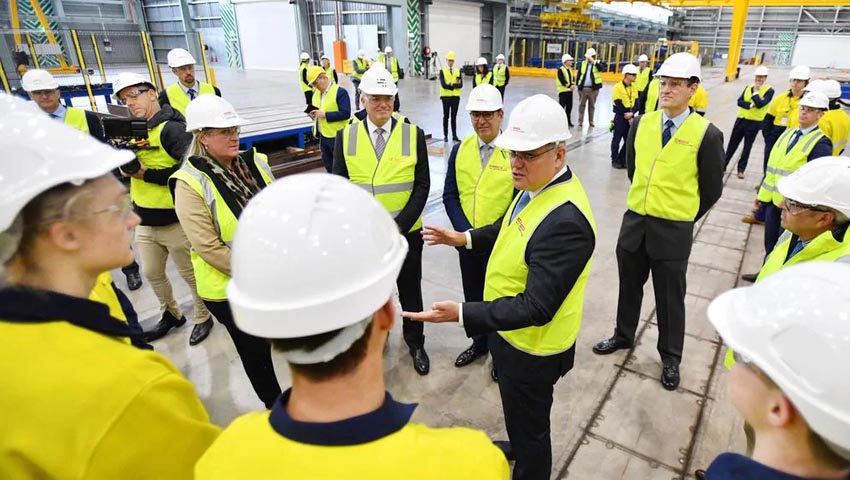Australia’s defence industry has welcomed Prime Minister Scott Morrison’s $1.3 billion ‘Modern Manufacturing Initiative’ as part of the government’s long-term post-COVID economic modernisation and redevelopment plan, with defence industry playing a pivotal role.
Prime Minister Scott Morrison has lift the lid on a multibillion-dollar initiative to support the nation's post-COVID economic recovery and national resilience at an address in the National Press Club, Canberra – this 'Modern Manufacturing Initiative' will see a major shift in the nation's economic capacity.
"We make things in Australia. We do it well. We need to keep making things in Australia. And with this strategy, we will. Our Modern Manufacturing Strategy is at the heart of our JobMaker plan. It starts with creating a stable and competitive business environment to grow our all parts of our manufacturing sector, but it does not end there," the Prime Minister explained.
The centrepiece of the strategy is the $1.3 billion Modern Manufacturing Initiative (MMI), which will see the government strategically invest in projects that help manufacturers to scale up and create jobs.
The MMI will support projects within six National Manufacturing Priorities, which reflect Australia’s established competitive advantages or emerging areas of priority:
- Resources technology and critical minerals (including rare earth elements) processing;
- Food and beverage;
- Medical products;
- Recycling and clean energy;
- Defence; and
- Space.
Federal Minister for Industry, Science and Technology Karen Andrews added, "Our manufacturers have risen to the challenge to deliver during COVID-19 and now, we’re unlocking their potential to deliver for our future. By playing to our strengths, strategically investing and boosting the role of science and technology in industry, we can open up new markets and take more of our quality products to the world.
"This is about Australia playing to its strengths and the government strategically investing in areas of manufacturing where we know we have an edge and that can deliver the jobs we need," Minister Andrews added.
Industry will be engaged to co-design tailored road maps for each of the priority sectors to set clear goals over the next two, five and 10 years, and identify the barriers and opportunities that will guide action and investment. The strategy will also address the competitiveness of individual manufacturers in priority sectors, with a $52.8 million expansion of the Manufacturing Modernisation Fund.
The COVID-19 crisis has also highlighted the need to better understand and address our supply chain issues and opportunities. A $107.2 million Supply Chain Resilience Initiative will support projects that address an identified supply chain vulnerability.
This strategy builds on the work across government to improve economic conditions for business, including streamlining regulation, cutting red tape and cutting input costs. A key part of that will be cutting energy costs as outlined in the Gas-fired recovery statement on 15 September 2020.
Australia's defence industry has broadly welcomed the announcements made by the Prime Minister. BAE Systems Australia welcomed the government's long-term commitment to support industrialisation reform and its inclusion of Defence as a key pillar in a new strategy to underpin the nation’s future manufacturing resilience.
BAE Systems Australia chief executive Gabby Costigan said, "The announcement by the Prime Minister today is a show of support for the growth of advanced manufacturing in Australia. A strong and capable manufacturing industry is essential to delivering our modern defence capabilities and rebuilding the nation post COVID-19."
BAE Systems has for more than a decade provided a range of bespoke parts in to the global F-35 Joint Strike Fighter program through its advanced manufacturing facility in South Australia. It is also currently investing millions of dollars into advanced manufacturing in collaboration with industry and academia as it mobilises Australia’s largest ever surface shipbuilding program to build nine submarine hunting warships in South Australia.
The company’s advanced manufacturing and investment in world-leading technologies currently provides the Australian Defence Force with the edge it needs across air, land, sea and in the cyber domain now and in the future.
"The defence industry has enormous potential as a catalyst for economic growth, providing long-term opportunities for industry, highly skilled jobs and potential exports. Now more than ever, the investment in and development of Australian made technologies has the potential to both underpin much needed economic growth and meet the technological needs of our defence force," Costigan added.
Joe North, chief executive of Lockheed Martin Australia and New Zealand, echoed these sentiments, telling Defence Connect, "Lockheed Martin Australia is an advanced technology business with a breadth of capabilities that span the defence and space sectors. Australia’s defence and space sectors are vital, vibrant and capable with an abundance of the advanced technologies necessary to support high-value, high-skilled jobs.
"Our approach to the development of Australian industry is based on establishing mutually beneficial partnerships with SMEs to help build both the capability and operational resilience needed for those companies to compete globally. Today’s announcement underscores the importance of a robust and resilient industry capability to Australia’s future economic prosperity and we are proud to support this national endeavour."
Joining the feedback, Raytheon Australia managing director Michael Ward said, "Raytheon Australia welcomes the announcement of the Prime Minister’s modern manufacturing strategy and the inclusion of defence amongst its priority sectors.
"Through manufacturing defence industry has a vital role to play in building resilience and sovereign capability and we look forward to learning more about the government’s Modern Manufacturing Initiative. I am also pleased that the next week’s budget will focus on appropriate incentives to encourage greater investment in R&D."
Innovation and Science Australia will be repurposed as Industry Innovation and Science Australia, to provide a long-term perspective on growing the manufacturing sector and strong industry advice to government throughout the implementation of the strategy.
The government is also comprehensively reviewing existing industry programs to better align them with the strategy. As part of this, it will provide an additional $50 million to the Industry Growth Centres initiative to support projects in the priority areas out until the end of June 2022.



